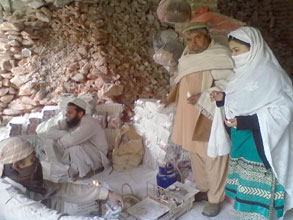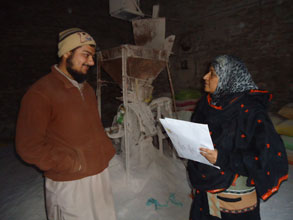News
Canada announces historic investment in the global fight against malnutrition
February 6, 2025
WP_Term Object
(
[term_id] => 49
[name] => Field Stories
[slug] => all-field-stories
[term_group] => 0
[term_taxonomy_id] => 49
[taxonomy] => news-category
[description] => Discover the personal stories of people whose lives have been impacted by better nutrition, and those working tirelessly to deliver it.
[parent] => 0
[count] => 180
[filter] => raw
)
Pushing health outcomes and gender roles in Pakistan
In Pakistan's Sindh and Khyber Pakhtoonkhwa provinces, two women are working to improve the health of 6.3 million people.
Posted on March 7, 2012


How female salt extenders in two Pakistani provinces are challenging gender barriers
In Pakistan‘s Sindh and Khyber Pakhtoonkhwa provinces, two women are working to improve the health of 6.3 million people.
Samina Kausar and Sapna Wisal oversee the iodization of salt, an important health intervention in areas with high rates of iodine deficiency disorders, malnutrition and poverty.
But their work is powerful in another way too. Samina and Sapna are breaking through Pakistan’s gender barriers and motivating other women to join the workforce.
Samina and Sapna are known as “salt extenders.”
They oversee salt iodization for the Micronutrient Initiative (MI), and provide training and monitoring to salt processors, ensuring quality control where the government lacks capacity. They work alongside district authorities and deliver awareness sessions to medical workers, community workers, and religious leaders on the importance of using iodized salt.


Adding iodine to salt has enormous health benefits where the population is at risk of iodine deficiency, especially for pregnant women and for the development of young children, protecting newborns from mental impairment and helping children reach their full intellectual potential.
“We are doing something for the real benefit of the people and our work is changing lives,” said Sapna.
But according to Samina, many Pakistanis do not think their job is appropriate for a woman. It is unusual for women to travel in the field so much, and interact so regularly with males.
“Initially I had some issues,” said Sapna, who has been working as a salt extender since April 2010. “People in the field – salt producers and retailers – used to dislike me and feel uncomfortable.”
Samina acknowledges other difficulties like security, road blocks and working full-time in a culture where some still believe a woman’s role is in the family home.
“There are some conservative areas where men look at us and do not like women working,” she said. Samina, who is married with a one-year old child, thinks they should change their attitude.
Though men dominate the field, Samina and Sapna have a third female colleague in Pakistan’s Punjab province.
“I feel lucky and proud,” said Samina.
Despite the challenges, both women believe their gender brings added value to their job. Sapna points out that women can reach groups in a community that a man cannot access.
In their social and cultural context, Samina adds, people are more likely to follow the advice of a woman. This gives her an advantage in a role that emphasizes training, capacity building and spreading awareness.
Both Sapna and Samina acknowledge that their roles are still viewed as a “man’s job.” But Samina says her community is proud of her, especially when elders and senior district officials recognize her hard work. Sapna says her family is happy that her work benefits so many people.
The economic empowerment of women is key to achieving gender equality, as well as pulling communities out of poverty.
By doing their jobs, Samina and Sapna are helping to improve the health and development of millions and at the same time are challenging their communities and their leaders to rethink a women’s role.
Other women may be motivated to seek similar jobs, said Sapna, after seeing how she works in the field and the positive example she sets. Although people were initially surprised to see a woman in her role, she says she is treated with respect and is able to achieve results.
“Now in Pakistan, women are in all the fields,” said Sapna, pointing to the ranks of UN agencies and the education department.
Samina admits that being a salt extender can be difficult for females in Pakistan, though it depends on a woman’s courage and will. Otherwise, she said, “this job is open for all.”